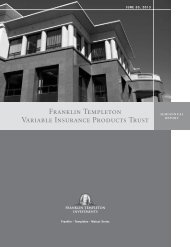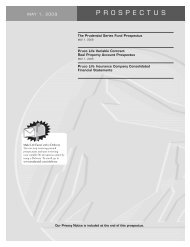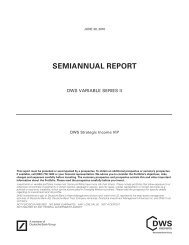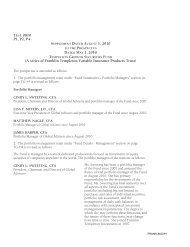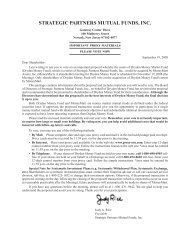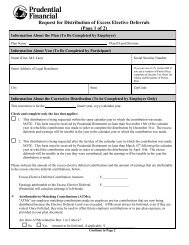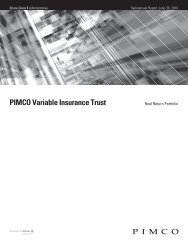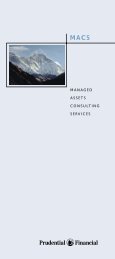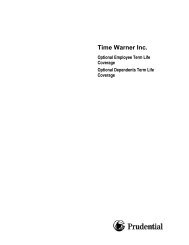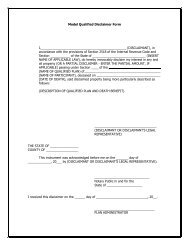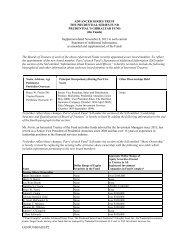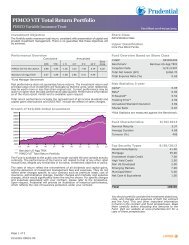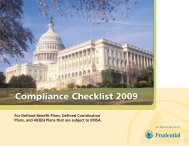Advanced Series Trust AST Academic Strategies Asset ... - Prudential
Advanced Series Trust AST Academic Strategies Asset ... - Prudential
Advanced Series Trust AST Academic Strategies Asset ... - Prudential
You also want an ePaper? Increase the reach of your titles
YUMPU automatically turns print PDFs into web optimized ePapers that Google loves.
more information about the Portfolios’ use of options, see the SAI.<br />
Options. Each Portfolio may purchase and sell put and call options on debt securities, swaps, and currencies traded on U.S. or<br />
foreign securities exchanges or in the over-the-counter market. An option gives the purchaser the right to buy or sell securities, swaps<br />
or such currencies in exchange for a premium. The options may be on debt securities, aggregates of debt securities, financial indexes,<br />
U.S. government securities, foreign government securities, swaps and foreign currencies. Each Portfolio will sell only covered<br />
options. Covered options are described in the SAI.<br />
TRACERS and TRAINS. Tradable Custodial Receipts or TRACERS represent an interest in a basket of investment grade corporate<br />
credits. Targeted Return Index Securities or TRAINS represent an interest in a basket of high yield securities of varying credit quality.<br />
Only the Jennison Value Portfolio may invest in TRAINS. Interests in TRACERS and TRAINS provide a cost-effective alternative to<br />
purchasing individual issues.<br />
<strong>Asset</strong> Segregation for Derivative <strong>Strategies</strong>. As open-end management investment companies registered with the Commission, each<br />
Portfolio are subject to the federal securities laws, including the Investment Company Act of 1940 Act (the 1940 Act), related rules,<br />
and various Commission and Commission staff positions. In accordance with these positions, with respect to certain kinds of<br />
derivatives, each Portfolio must “set aside” (referred to sometimes as “asset segregation”) liquid assets, or engage in other<br />
Commission- or staff-approved measures, while the derivative contracts are open. For example, with respect to forwards and futures<br />
contracts that are not contractually required to “cash-settle,” a Portfolio must cover its open positions by setting aside liquid assets<br />
equal to the contracts’ full, notional value. With respect to forwards and futures that are contractually required to “cash-settle,”<br />
however, a Portfolio is permitted to set aside liquid assets in an amount equal to such Portfolio’s daily marked-to-market (net)<br />
obligations, if any (i.e., such Portfolio’s daily net liability, if any), rather than the notional value. By setting aside assets equal to only<br />
its net obligations under cash-settled forward and futures contracts, a Portfolio will have the ability to employ leverage to a greater<br />
extent than if such Portfolio were required to segregate assets equal to the full notional value of such contracts. The Fund reserves the<br />
right to modify the asset segregation policies of each Portfolio in the future to comply with any changes in the positions articulated<br />
from time to time by the Commission and its staff.<br />
Debt Obligations. Under normal circumstances, up to 20% of a Portfolio’s total assets may be invested in debt obligations. When<br />
acquiring these types of securities for the Jennison Value Portfolio, the Subadviser will normally invest in obligations rated investment<br />
grade. Investment-grade obligations are rated in one of the top four long-term quality ratings by a major rating service (such as Baa/<br />
BBB or better by Moody’s or S&P, respectively). Obligations rated in the fourth category (Baa/BBB) have speculative characteristics.<br />
These lower-rated obligations are subject to a greater risk of loss of principal and interest. The Jennison Value Portfolio may, however,<br />
also invest up to 10% of its total assets in obligations rated below investment grade by Moody’s and S&P. Debt securities rated below<br />
investment grade are considered to be predominately speculative with respect to an issuer’s capacity to pay interest and repay<br />
principal in accordance with the terms of such obligations. Jennison may also invest in instruments that are not rated, but which it<br />
believes are of comparable quality to the instruments described above. The Jennison Growth Portfolio will not invest in debt<br />
securities rated below investment grade.<br />
The Portfolios may invest in various types of debt obligations, including, without limitation: (i) U.S. Government securities; (ii) certain<br />
debt obligations issued or guaranteed by the U.S. Government and government-related entities, including mortgage-related securities;<br />
(iii) privately-issued mortgage-related and asset-backed securities; (iv) debt obligations of U.S. corporate issuers; and (v) derivatives<br />
and synthetic instruments that have economic characteristics that are similar to these types of securities and obligations.<br />
<strong>AST</strong> JPMorgan International Equity Portfolio<br />
Investment Objective: to seek capital growth.<br />
Principal Investment Objectives:<br />
The Portfolio will invest, under normal circumstances, at least 80% of the value of its assets in equity securities. The 80% investment<br />
requirement applies at the time the Portfolio invests its assets. Equity securities include common stocks, securities convertible into<br />
common stocks and securities having common stock characteristics or other derivative instruments whose value is based on common<br />
stocks, such as rights, warrants or options to purchase common stock, preferred stock, convertible preferred stock, convertible bonds,<br />
convertible debentures, convertible notes, depository receipts, futures contracts and swaps investments.<br />
The Portfolio seeks to meet its investment objective by normally investing primarily in a diversified portfolio of equity securities of<br />
companies located or operating in developed non-U.S. countries and emerging markets of the world. The equity securities will<br />
ordinarily be traded on a recognized foreign securities exchange or traded in a foreign over-the-counter market in the country where<br />
the issuer is principally based, but may also be traded in other countries including the United States.<br />
The Portfolio will normally allocate its investments among a variety of countries, regions and industry sectors, investing in several<br />
242



